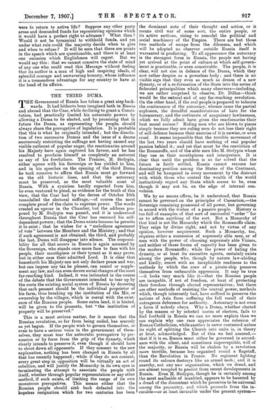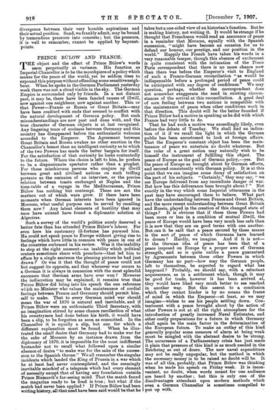THE THIRD DUMA.
TIHE Government of Russia has taken a great step back- 1 wards. It had hitherto been imagined both in Russia and abroad that the Czar, while declining to grant a Consti- tution, had practically limited his autocratic powers by allowing a Duma to be elected, and by promising that in future the Puma, as representing the people, should always share the prerogative of legislation. It is probable that this is what he originally intended ; but the dissolu- tion of two successive Dumas and the issue of a decree enormously restricting the suffrage not having caused any visible outburst of popular anger, the reactionaries around his Majesty have again captured his favour, and he has resolved to proclaim himself as completely an autocrat as any of his forefathers. The Premier, M. Stolypin, either agrees with his Sovereign or has yielded to him, and in his speeches on the opening of the third Duma he took occasion to affirm that Russia must go forward on the old historic lines, and that the autocracy must be preserved, as the most valuable asset of Russia. With a cynicism hardly expected from him, he even ventured to plead, as evidence for the truth of this -view, that the Czar had by the decree of October 16th remodelled the electoral suffrage,—of course the most complete proof of the claim to supreme power. The words created an uproar in the Chamber, but the address pro- posed by M. Stolypin was passed, and it is understood throughout Russia that the Czar has resumed his self- dependent powers ; that the Puma exists because he permits it to exist ; that he wishes for a " melodious agreement of vote " between the Members and the Ministry ; and that if such agreement is not obtained, the third, and probably the last, Puma will disappear into silence. The responsi- bility for all that occurs in Russia is again assumed by the Sovereign, who stands once more face to face with his people, their mouthpiece or their tyrant as it may prove, but in either case their admitted Lord. It is clear that henceforth his Majesty can not only declare peace and war, but can impose any tax he pleases, can cancel or supple- ment any law, and can even decree social changes of the most far-reaching kind. Indeed, it was intimated in the course of the debate that the Government intended to tear up by the roots the existing social system of Russia by decreeing that each peasant should be the individual proprietor of his farm, thus breaking up the institution of the Mir, or ownership by the villages, which is coeval with the exist- ence of the Russian people. Some extra land, it is hinted, will be given to the peasants, but " the institution of property will be preserved."
This is a most serious matter, for it means that the Russian revolution, so far from being ended, has scarcely as yet begun. If the people wish to govern themselves, or even to have a serious voice in the government of them- selves, they must tear the autocratic prerogative by per- suasion or by force from the grip of the dynasty, which clearly intends to preserve it, even though it should have to shoot down all opponents. If they consent to the new explanation, nothing has been changed in Russia by all that has recently happened ; while if they do not consent, every great step in opposition will be virtually an act of rebellion, and will justify the Monarchy in its own eyes in :terminating the attempt to associate the people with itself, whether through popular representation or any other method, if such exists, of limiting the range of its own monstrous prerogatives. This means either that the .Russian people should sink back defeated into the hopeless resignation which for two centuries has been the dominant note of their thought and action, or it means civil war of some sort, the entire people, or its active sections, rising to remodel the political and social machinery of the Empire. There are but those two methods of escape from the dilemma, and which will be adopted no observer outside Russia itself is warranted in predicting. To all appearance the autocracy is the strongest force in Russia, the people not having yet arrived at the point of culture at which self-govern- ment is practicable, or even conceivable. The people, it.is clear, will not rise in defence of the Duma, which they now rather despise as a powerless body ; and there is no visible sign that they even so much as dream of a new dynasty, or of a re-formation of the State into the series,of federated principalities which many observers—including, we are rather surprised to observe, Dr. Dillon—think would be the natural end of any far-reaching revolution. On the other hand, if the real people is prepared to tolerate the continuance of the autocracy, whence came the partial explosion, the dreadful manifestations of hate for the bureaucracy, and the outbursts of sanguinary lawlessness, which we fully admit have given the reactionaries their best moral excuse ? Ruling men who are blown to pieces simply because they are ruling men do not lose their right of self-defence because their exercise of it is unwise, or even cruel. It seems impossible that the terrible movement of the last two years should have nothing of real popular passion behind it; and yet that must be the conviction of the Romanoffs, and of the able men like M. Stolypin whom they use as their mouthpieces and interpreters. It is clear that until the problem is so far solved that the future is fairly settled, Russia cannot resume her dominating position among the States of the Continent, and will be hampered in every movement by the distrust with which those who control the wealth of the world instinctively regard any State which seems to be, even though it may not be, on the edge of internal con- vulsion.
We by no means affirm, be it understood, that Russia cannot be governed on the principles of Caesarism,—the Sovereign remaining possessed of all power, but governing in accord with the wishes of a passive people. History is too full of examples of that sort of successful "order " for us to affirm anything of the sort. But a Monarchy of that kind is not the Monarchy which the Romanoffs claim. They reign by divine right, and not by virtue of any opinion, however acquiescent. Such a. Monarchy, too, requires either a succession of supremely able men, or of men with the power of choosing supremely able Viziers, and neither of those forms of capacity has been given to the modern Romanoffs ; while the power of hating the dynasty, or at least its executive agents, certainly exists among the people, who, though by nature law-abiding and kindly, resort with an inexplicable readiness to the methods by which the crew of a pirate-ship preserve themselves from unbearable oppression. It may be true —it looks very much like it—that the Russian people are incapable, if not of freedom, at least of protecting their freedom through elected representatives ; but there are other methods of resisting the central power, methods which, though inherently bad, have sufficed to preserve the nations of Asia from suffering the full result of their outrageous deference for authority. Autocracy is not even a force if nobody obeys. Why a Duma, whether elected by the masses or by selected castes of electors, fails to find foothold in Russia we can no more explain than we can explain why one race appreciates the cohesion of Roman Catholicism, while another is never contented unless its right of splitting the Church into units is, in theory at least, acknowledged. But of this we feel assured,— that if it is so, Russia must either be governed in accord- ance with the silent, and sometimes imperceptible, will of the majority, or Russia will be shaken by a revolution more terrible, because less organised round a flagstaff, than the Revolution in France. No regiment fighting round its colours destroys like an armed mob ; and it is anarchy, not any new organisation, which we dread, and are almost tempted to predict from recent developments in Russia. Even M. Stolypin, though he is certainly among the most malleable of mankind, appears to be haunted by a dread of the discontent which he perceives to be universal among the peasantry, and which proceeds from the in- curable—or at least incurable under the present system- divergence between their very humble aspirations and their actual position. Sand, we frankly admit, may be bound by tremendous pressure into concrete ; but the pressure, it is well to remember, cannot be applied by bayonet- points.











































































 Previous page
Previous page